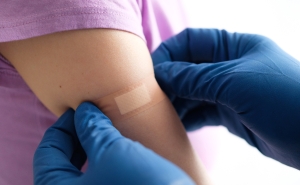
As knowledge of SARS-CoV-2 has grown—how it spreads, what it does to cells, how it detonates an immune response that can be deadly or debilitating—so have our defenses against it. The past year brought accurate tests, effective vaccines, monoclonal antibodies, refined treatment protocols, and two oral antivirals now under consideration by the FDA. New vaccines and treatments are in development, all promising to further strengthen our resilience to this virus.
In this Q&A, Center for Health Security senior scholar Amesh Adalja, MD, discusses the public health tools that can tame the virus, rendering it another respiratory virus—like flu and respiratory syncytial virus (RSV)—that we can manage.
Is Covid here to stay?
Early on, there were people, including myself, saying that this is going to become a seasonal coronavirus that is not containable. Removing its ability to cause serious disease at a high rate was the goal.
This virus is always going to be with us. It's just going to be something that doesn't have the capacity to crush a hospital or to scare us in the way that it could in the past because we have developed many more tools to deal with it, like vaccines, monoclonal antibodies, rapid diagnostic tests, and antivirals. We’ve also learned a lot about transmission and what's high risk and what's low risk. And we also know who is more likely to need hospitalization and who is more likely to have a mild case. All of that helps us learn to live with this virus, to make risk calculations regarding this virus just like we do with influenza and other respiratory viruses.
Let’s talk about the tools we’ve developed and the roles they’ll play post-pandemic. What’s the role for antivirals?
The only treatments we have now are mostly hospital-based, like remdesivir and monoclonal antibodies, which can be logistically difficult to get. When these oral antivirals become available in the United States, we’ll have simple pills that can prevent hospitalization and death. That makes COVID a much more treatable condition than it was in the past. It will take COVID down several notches in terms of how easy it is to deal with from a patient perspective, from a doctor's perspective, from a health care system perspective.
If what's shown in the clinical trials is borne out in the real world, these antivirals will be game-changing. It will be a major milestone in treating COVID-19 and defanging it.
What about vaccination? We’re in a phase now where lots of people are getting boosters. Will we need them again, or seasonally, like with the flu?
Vaccination is going to be key to keeping COVID-19 a manageable illness, and I do assume that this will become a routine vaccination. It's too early to know exactly what will be the future of vaccines. Right now we're dealing with first-generation vaccines that are attuned to preventing serious illness and hospitalization. I would reserve any predictions on what will happen to vaccination policy until we see more of the second-generation vaccines.
As a society, we need to decide our goals for COVID vaccines. Are we trying to prevent serious illness, hospitalization, and death? Our current vaccines do a really good job of that. Or do we want to try to get transmission down as low as possible? If we want a vaccine to prevent more infections, more like the measles vaccine, that may change the way our vaccine policy looks in the future. It’s too early to say.
What about the role of testing post-pandemic?
For healthy people who have no symptoms at all and who are fully vaccinated, I think there’s marginal value in testing. But for symptomatic people, and for people who are not vaccinated, there is still and will still be a role for testing.
We have lagged in testing from the very start, and our inability to test as much as necessary caused our pandemic response to falter. But I think we're going to see this evolve. Hopefully, we have momentum from these home tests to expand to not just COVID-19 but flu, RSV, strep throat, and many other illnesses. I’m excited about what will happen with testing now that we seem to have broken the logjam that prevented home tests from being widely accepted.
And testing is going to be important for the use of those antivirals, because people will need to have a positive test before taking them.
Will there still be a role for nonpharmaceutical interventions, like social distancing and masking?
I don't think we’ll see them used with the same force as in the past, in terms of mandates. You might see them recommended if there are clusters or outbreaks. There are also definitely going to be people who are more risk-averse and continue to use them to some degree—and maybe not just for COVID, but for influenza and other respiratory viruses.
But when we have refined, specific, precision tools like we have now, blunt nonpharmaceutical interventions have less value. They are going to be less acceptable when we have better ways to tame the virus.
Melissa Hartman is the managing editor of Hopkins Bloomberg Public Health magazine and associate director of editorial at the Johns Hopkins Bloomberg School of Public Health.




